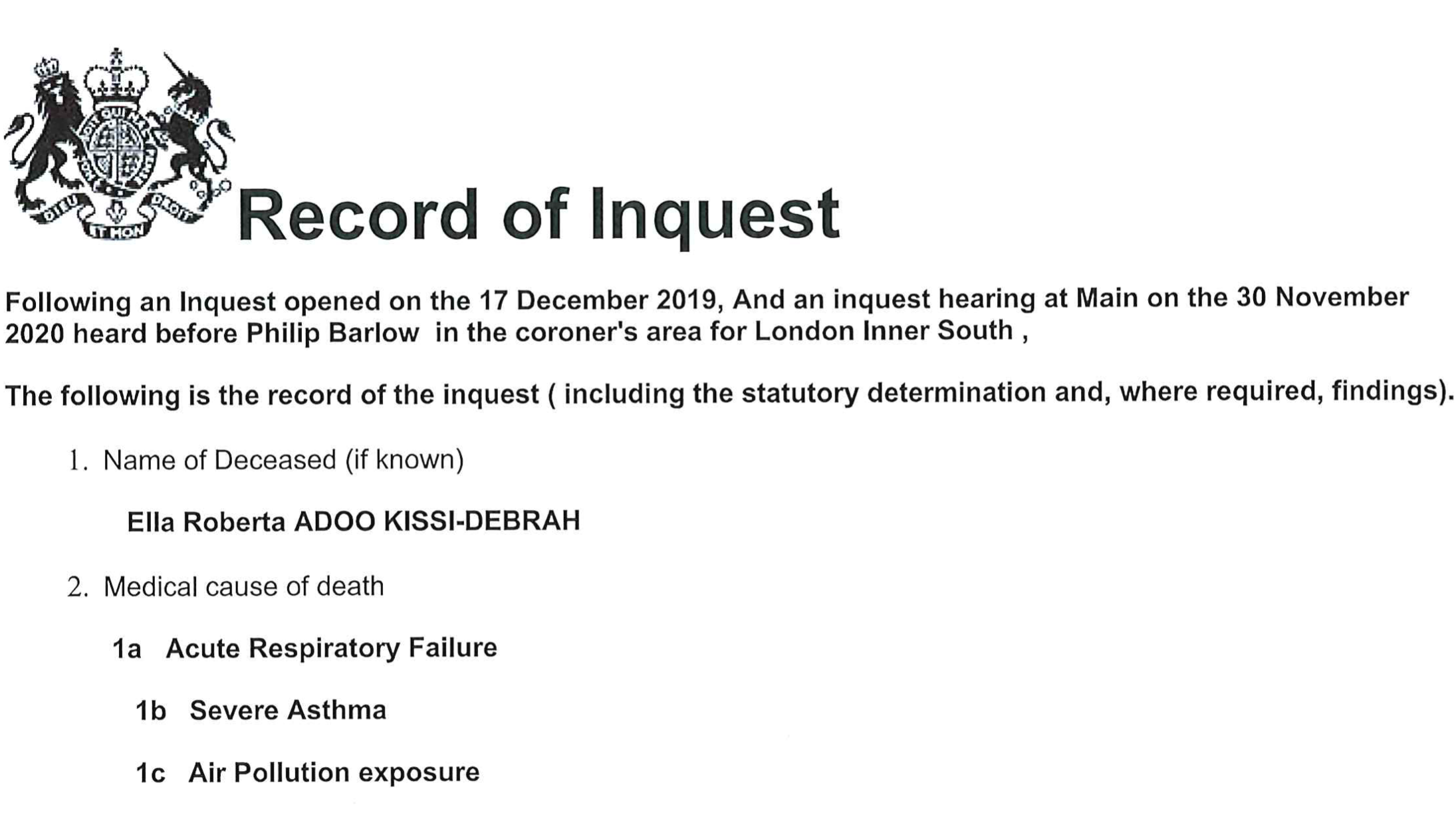Air Pollution Is Recorded As An Official Cause Of Death For The First Time
A coroner's inquest into the death of Ella Adoo-Kissi-Debrah reached a remarkable conclusion last week. The ruling by the Southwark Coroner's Court, issued December 16, officially concluded that air pollution was a cause of death for the girl, 9, who had lived near South Circular Road in London.
Ella had been hospitalized dozens of times for severe asthma attacks, and her condition disabled her from an early age. The coroner's ruling following her death in 2013 suspected air pollution as a contributing factor, the BBC reports.
The girl's mother, Rosamund Adoo-Kissi-Debrah, pursued further investigation, which has now resulted in an amended coroner's report. The report is unlike any known to have been previously recorded .
Today was a landmark case, a 7 year fight has resulted in air pollution being recognised on Ella's death certificate. Hopefully this will mean mean many more children's lives being saved. Thank you everyone for your continued support. pic.twitter.com/02iNxVgmRd
— Dr. Rosamund Adoo-KD CBE FBSA (@EllaRobertaFdn) December 16, 2020
In the years following Ella's death, her mother became an advocate with the World Health Organization, which warned officials in London that air pollution levels exceeded safe limits. A report released in November cited related figures, courtesy of the BBC:
"The government estimates the number of people killed by long-term exposure to air pollution in the UK to be as high as 30,000 a year. However, no direct link to an individual death has ever been made."
Now that direct link exists for the first time, and the cause of death on Ella's death certificate will reflect the findings. The cause was previously listed as "Acute Respiratory Failure." Back then, the coroner could only speculate that it was triggered by "something in the air." Officials are now past speculation and have declared her medical cause of death to be acute respiratory failure, severe asthma and air pollution exposure:

The ruling is significant because it is not citing correlation; it cites cause. Until this verdict, air pollution could merely be associated with an individual's cause of death. This concludes air pollution was one of the actual causes of death.
Clean-air advocates pointed to the ruling and claim it has established the necessary precedent to effect change and begin good-faith dialogues addressing air pollution in the UK. London's Mayor, Sadiq Khan, remarked the following in response to the ruling:
"Toxic air pollution is a public health crisis, especially for our children, and the inquest underlined yet again the importance of pushing ahead with bold policies such as expanding the Ultra Low Emission Zone to inner London. Ministers and the previous Mayor have acted too slowly in the past, but they must now learn the lessons from the Coroner's ruling and do much more to tackle the deadly scourge of air pollution in London and across the country."
The ruling marks the first record of air pollution as a cause of death in the UK, but is possibly the first such official record around the world. We are all affected by air pollution — well, except for the crew of the ISS, perhaps.
The direct health effects of air pollution are very much evident in the States, too. In Detroit, the Marathon Petroleum Company is buying out homes near one of its refineries, spending $5 million to create distance between it and residential areas, per the Detroit News.
Marathon is polluting the local air so badly that it's paying for relocation and legal fees on top of the home's values. And this comes after federal regulators investigated the company for another instance of pollution in September 2019. But the pollution is not limited to the Motor City.
The NIH has considered air pollution a carcinogen as far back as 2013, and in 2019 released a thorough report providing an overview of traffic-related air pollution. Cancer is not the only effect: Chronic health conditions such as COPD and even diabetes can be either traced or exacerbated by air pollution.
Asthma, which contributed to Ella's death, is so affected by external environmental factors that the CDC has an interactive map that can help track air pollution around the U.S. Carnegie Mellon University's Center for Air Quality, Climate, and Energy Solutions (CACES) released a study that concluded the following:
"The estimate of lives that could be saved by further reduction of air pollution levels is more than thirty thousand, which is similar to the number of deaths from car accidents each year."
We should note that as enthusiasts and drivers, we are not exempt from future discussions around these events. These will, and should, include us, but lasting change will depend on a scale that exceeds private car ownership. Heavy industries and commercial transportation must be heavy lifters in curbing harmful emissions, too.
Green initiatives are already accelerating around the world. For campaigners and advocates, change can't come soon enough. The recent announcements have surprised us, but for those in orbit of Ella and her family, they are the exact thing we need to prevent such loss of life, and to increase quality of life for all.
